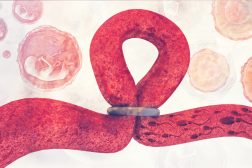Definition
noun
(genetics) A cell or an organism containing more than two sets of homologous chromosomes
adjective
(genetics) Of or pertaining to a condition in which there is only half of the complete set of chromosomes in somatic cells
(anatomy) Resembling a polyp, or polyp-shaped, as in polypoid lesions in stomach
Supplement
In genetics, ploidy refers to the number of sets of homologous chromosomes in the genome of a cell or an organism. Each set is designated by n. Polyploidy is the state of having more than two sets of chromosomes. The term polyploid would therefore refer to a cell (or an organism) with more than two sets of homologous chromosomes. This is used in contrast to cells or organisms with typically diploid number of homologous chromosomes. In humans and other living things, the diploid state of somatic cells is due to the resulting union of gametes in haploid state during fertilization. One of the two sets is derived from the mother’s gamete and the other is from the father’s gamete. This would result in a diploid zygote with two copies of chromosomes and is represented by 2n. Humans, in particular, have 23 chromosomes in sex cells and 46 chromosomes in somatic cells. Polyploidy occurs when there are multiple sets of chromosomes beyond the basic set. There are different types of polyploids according to the number of sets of chromosomes in a nucleus: triploid (three sets), tetraploid (four sets), pentaploid (five sets), hexaploid (six sets), heptaploid or septaploid (seven sets), octaploid or octoploid, (eight sets), decaploid (ten sets), dodecaploid (twelve sets), etc. Polyploidy is more common in plant species than animal species.
In anatomy, the term polyploid is used as a descriptive term for structures resembling polyps, as in in polypoid lesions in stomach. Nevertheless, the use of the term polploid is more popular in the field of genetics than in anatomy.
Word origin: Greek haplous (single”)
Compare:
See also:
Related forms:
- polyploidy (noun)







